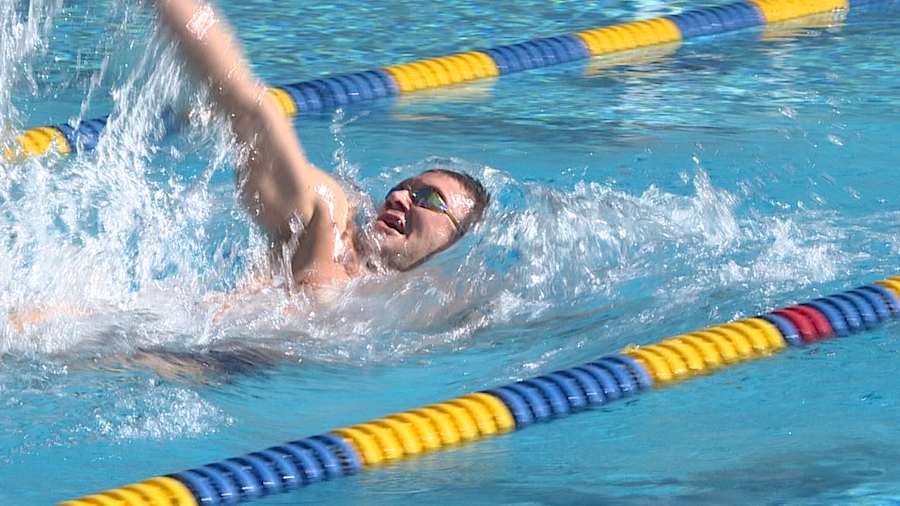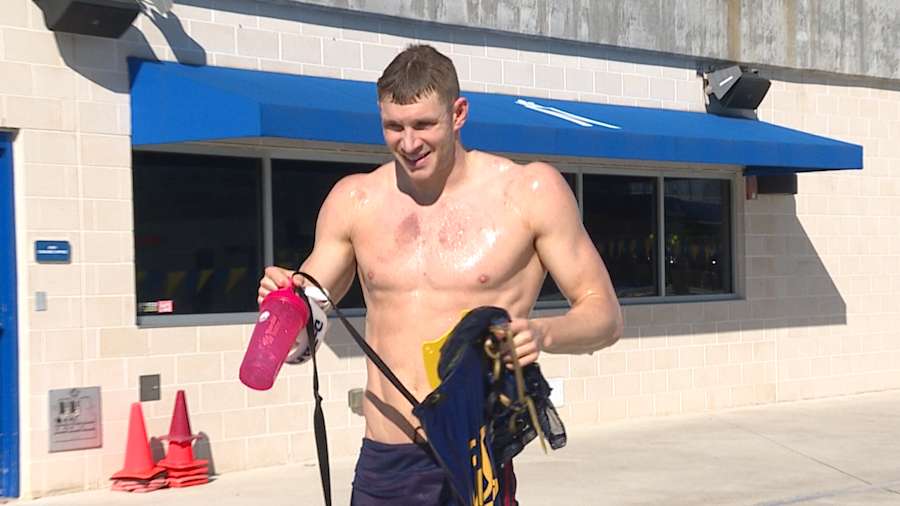SAN ANTONIO – “One percent everyday."
It’s a simple mantra: find a way to improve by 1% every day. That’s Ryan Murphy’s philosophy every time he enters the water for practice.
“If you break it down into small enough increments, it doesn’t feel daunting. I’m not trying to get 10% better over a six month period, I’m trying to be 1% better each day. By the time that gets to the end of the year, that’s a lot of percentage points."
That thought process is a big reason why Murphy is the latest to carry on a long and proud tradition of American backstrokers.
At the 2016 Rio Olympic Games, Murphy burst onto the international stage. He won the 100 meter (51.97) and 200 meter (1:53.62) backstroke events, joining Michael Phelps as the only two male swimmers to win multiple individual events at the meet. The victories also continued one of the greatest dynasties in Olympic history: the United States men have won gold in every backstroke race since the Atlanta Games in 1996.
If that wasn’t enough, Murphy posted a world record in the leadoff leg of the Americans’ 4x100 Medley Relay. His 100m backstroke split of 51.85 erased backstroking icon Aaron Peirsol’s mark of 51.94 set back in 2009 during the infamous “Super-Suit Era.”
Murphy accomplished all of that as a 21-year old sophomore at the University of California, Berkeley. Now, as the 24-year old graduate of the Haas School of Business sets his sights on qualifying for the 2020 Olympic Games in Tokyo, he faces a new challenge:
“Getting attention," Murphy said. "I really flew under the radar heading into 2016, which was great. I was a college student, and I feel like my coach, Dave Durden, did a lot to shield me from media attention. That was awesome. It felt like I was going into any old meet. This time around, I have to navigate that pressure, but other than that, it really is the same focus for me. I’m going into the pool everyday, busting my butt, trying to stick to my plan that Dave and I have come up with. I’m really just trying to be the absolute best that I can be come the summer.”
Murphy and Durden, Cal’s men’s swimming head coach, have built a great relationship over the past seven years, and their intuitive level of trust and communication played an important role in Murphy’s decision to hold off on turning pro until after graduation.
“I almost feel indebted to Cal for my experience there," Murphy explained. "Those four years at Cal were the best four years of my life. Coming off the Olympics, obviously there’s a thought to capitalize on it right then. I didn’t want to put a lot of pressure on myself in that moment. I wanted to come back for my senior year and finish it out with the guys I came in with. I feel like I owed it to them, and I owed it to Dave Durden.”

Over the course of his four-year career at Cal, Murphy reshaped the definition of dominance in collegiate backstroke competition. He swept both individual backstroke titles at the NCAA Division I Championships in every season from 2015 to 2018, and currently owns both American Records. Now, two years removed from his final season with Cal and five months away from the U.S. Olympic Trials, the defending Olympic champion has already received an encouraging evaluation from Durden.
“The biggest thing he told me is that, ‘I’ve never seen you look this good,’" Murphy said. "That’s a big confidence boost for me, and that’s not just fluff. The times in practice are backing that up, so I feel really comfortable with where I’m at in the water.”
While his training and technique in the pool is paramount to success come race day, Murphy’s ever-expanding list of tasks and responsibilities out of the water are paying equally impressive dividends.
“Every year, you add on something else, things get a little bit more intense and you learn something new," Murphy explained. “This year, the biggest thing is sleep. I got one of those adjustable bases on my bed, and I’m loving that. Anytime I can get in my bed, I do. I’m really investing in that part of my recovery more than ever before. I also cook for myself every meal. I might go out with my buddies on a Saturday night or Sunday morning, but usually I’m cooking. I make it as healthy as possible. It can taste like total crap and I’m okay with it. That’s just where my headspace is at. I try to make it taste good, but first and foremost, I’m going for high nutritional value.
"You can just never rest. You never want to get complacent in this sport. This sport is brutal. The second you get complacent is the second you start swimming bad. You’ve just got to try to keep improving a little bit each day, and keep on trying to move that needle as close as you can to perfect.”
Every facet of Murphy’s training and preparation will be put to the test this summer, as he tries to reclaim his backstroking crown from an impressive international field. Aside from his victories in the 100m and 200m backstroke at the 2018 Pan Pacific Championships, the Americans have had trouble finishing atop the podium in either event in international competition since 2016.
At the 2017 World Championships in Budapest, Murphy settled for bronze in the 100m backstroke behind his teammate, London Olympic gold medalist Matt Grevers, and Chinese backstroking sensation Xu Jiayu. He also came up short in the 200 meter distance, taking home the silver medal behind Russia’s Evgeny Rylov. Two years later, at the 2019 World Championships in Gwangju, South Korea, the Americans finished off the podium entirely in the 100, with Murphy and Grevers taking 4th and 5th respectively behind Jiayu, Rylov and Australia’s Mitch Larkin. And once again, Rylov got the better of Murphy in the 200 meter backstroke final, sending the American home with another silver.
With Jiayu, Rylov and Larkin all swimming at their best, and seasoned Japanese veteran Ryosuke Irie ready to put on a show in his home pool, it’s abundantly clear that any one of these swimmers can strike gold in Tokyo.
“This is about as stacked of a field as you can get,” Murphy said. "It’s literally been the same [final] heat over the past five years. It’s ridiculous. No one breaks into backstroke. If you’re in that final, you’ve figured it out. There might be one or two guys that sneak in there, but it’s pretty consistent, and it’s a field that I’m comfortable racing because I’ve done it so many times.”
Should he succeed in defending both titles in Tokyo, Murphy will become the first American in history to sweep both backstroke events in back-to-back Olympics. The only other man to accomplish the feat is German legend Roland Matthes at the Mexico (1968) and Munich Olympic Games (1972).
But before Murphy can worry too much about racing on swimming’s biggest stage, he must first punch his Olympic ticket at the U.S. Trials in Omaha. That will be no easy task, with Grevers eager to secure his first spot on the roster since 2012 and an ever-present crop of young talent waiting in the wings for their own breakthrough moment.
For his part, Murphy is ready to meet that challenge head-on, “I kind of view that as a rehearsal. It’s probably more pressure-packed than the Olympics. If you can get through that, you’re going to be in a good spot going into Tokyo. Once you get into those big finals, anything can happen. For me, that’s a big motivational tactic. That helps me work really hard. At the end of the day, I’m trying to be the absolute best I can be.”
As it always does in the sport of swimming, time will tell. History will be on the line in Omaha, as the U.S. Olympic Trials begin on June 21.

